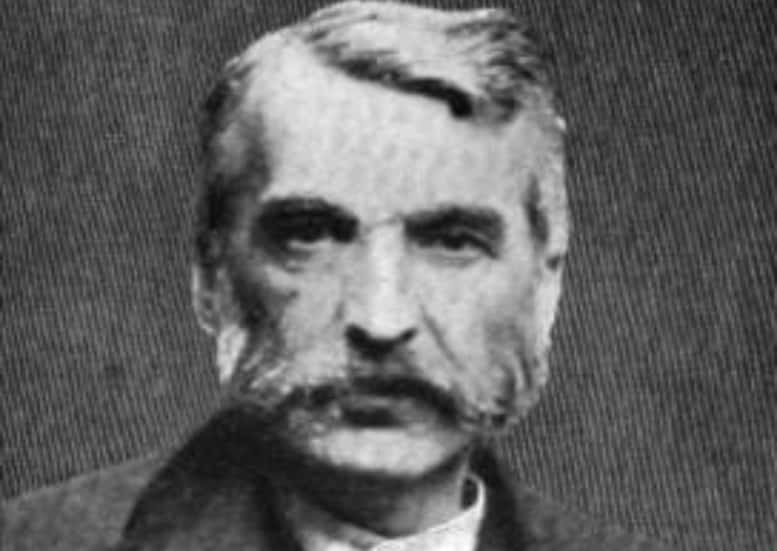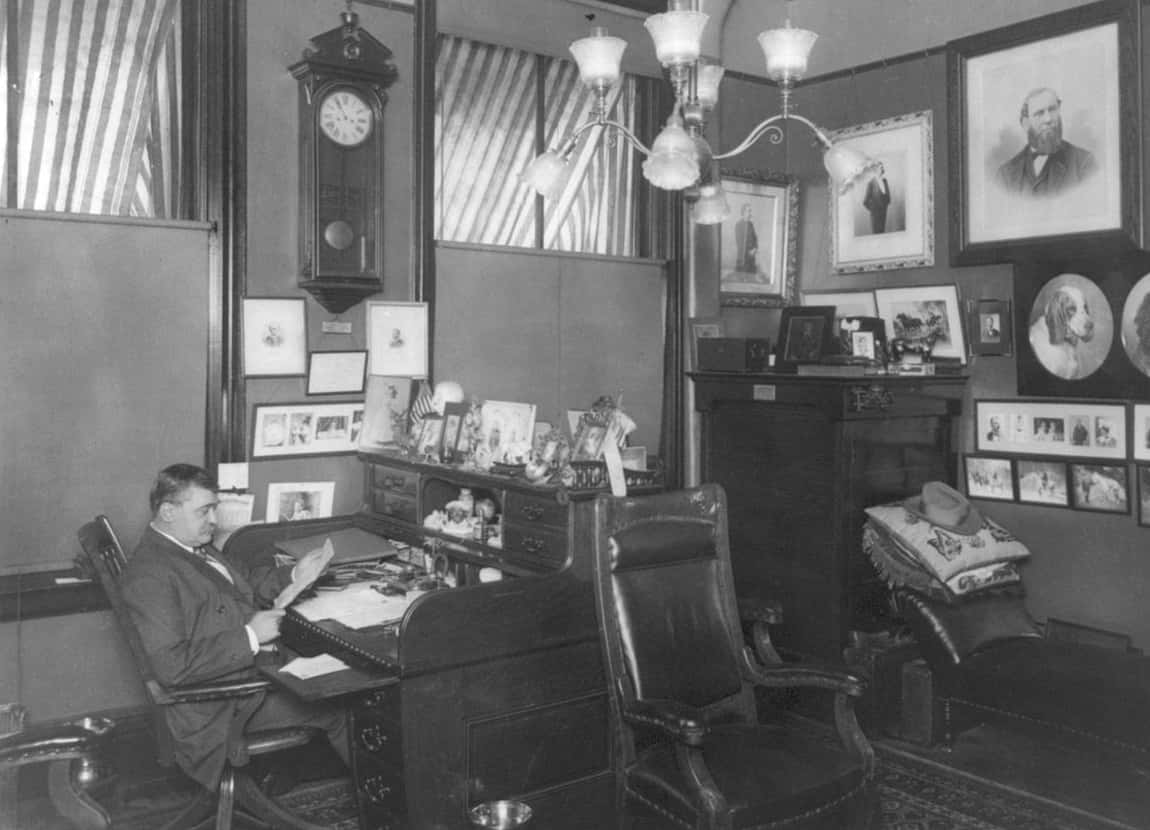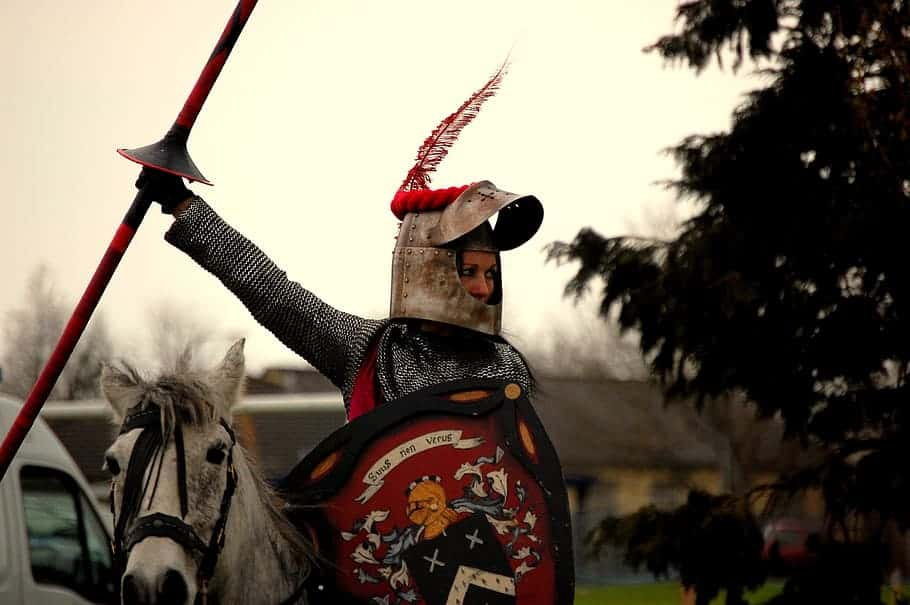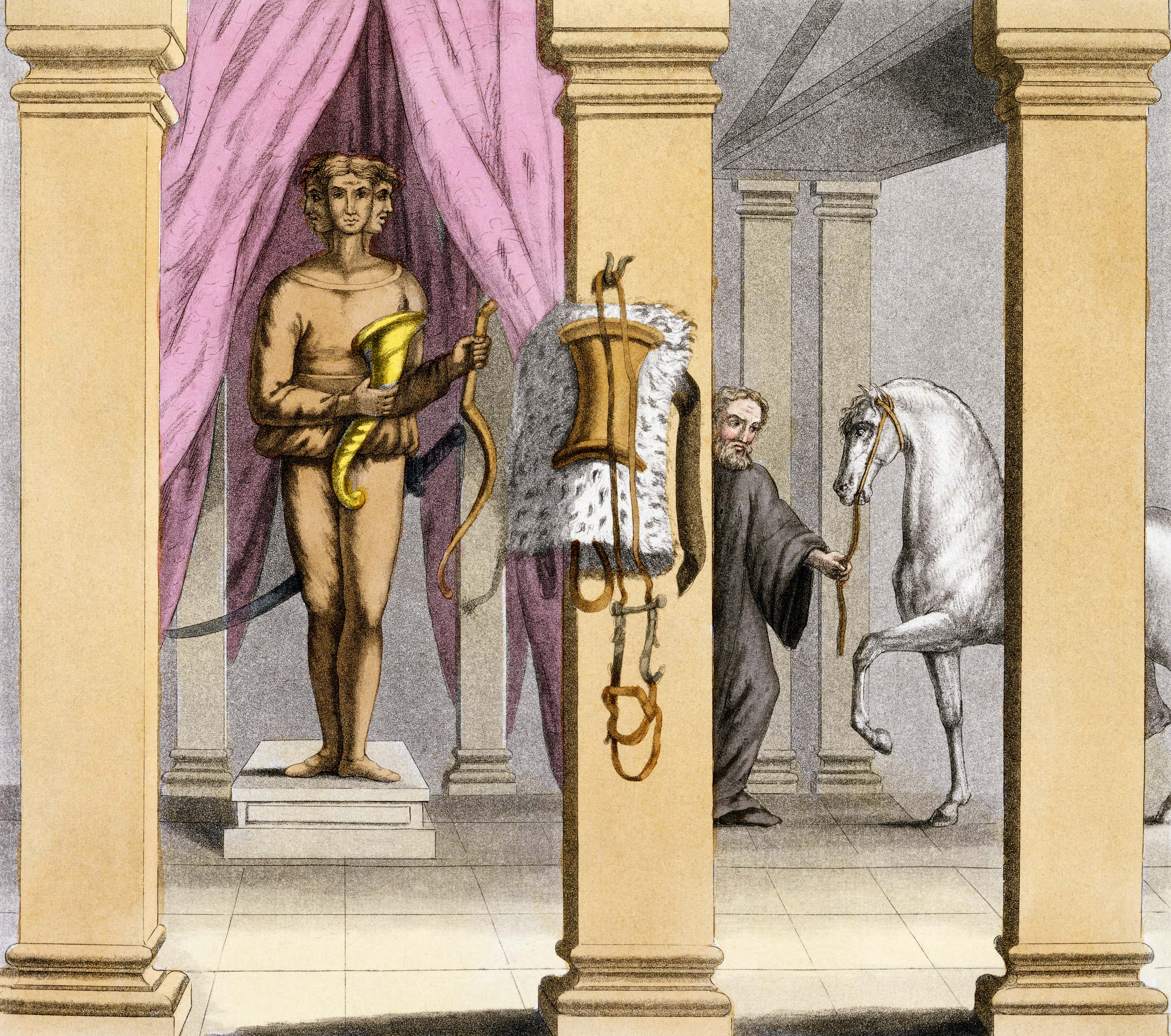History's Most Evil People
Occasionally, a unique type of lawbreaker emerges, one whose thirst for revenge, delusions of grandeur, or simply sheer awfulness propels them into the realm of cartoon supervillainy. For example, no one was spared from Edward Longshanks' brutal temper—but his revenge against Simon de Montfort was horrifying, even for him.

1. The Killdozer
For most people, the municipal government rejecting a zoning proposal wouldn't be enough to launch a rampage of revenge and destruction, but as the world would soon find out, most people were not Marvin Heemeyer. Heemeyer had asked the town council for Granby, Colorado, to halt the construction of a concrete plant next to his land.
When they refused, Heemeyer retreated to his secret lair—err, his muffler shop—for a whole year, building the ultimate weapon: the Killdozer.

2. Rampage
On June 4, 2004, Heemeyer unveiled his Killdozer, a 46-tonne Komatsu bulldozer fitted with foot-thick panels of steel and concrete. Secure behind the wheel of his absurdly powerful wrecking machine, Heemeyer cut a path of destruction through the town. In just two hours, the Killdozer knocked down 13 buildings and cut off the town’s gas supply.

3. The Best Laid Plans
With an armor of steel and concrete, along with damage-resistant plastic and three ports for Heemeyer's rifles, the Killdozer was practically indestructible. Granby law enforcement could do little but stand by and watch as Heemeyer crashed through building after building. Eventually, the National Guard was called in, armed with Apache helicopters and anti-tank missiles. Heemeyer's attack was inevitably going to come to an end—but few people expected the tragedy that was coming.
4. Scrapped
Embedded tightly into the base of Gamble’s Hardware Store, the Killdozer was utterly incapacitated. Trapped with no escape, Heemeyer chose to turn his firearm on himself instead of turning himself in. His machine was dismantled piece by piece and sold off for scrap, helping to recoup some of the $7 million in damage done that fateful day by the Killdozer.

5. A Real Gem
Embodying the character of daring adventurer-thief, Gerard Blanchard pulled off a series of high-end thefts across three continents. In one notable case, Blanchard took the Star of Sisi, a priceless diamond-and-pearl ornament worn by Empress Elisabeth of Austria, without permission. Blanchard spent a week posing as a tourist alongside his wife and his father; throughout this time, he was discreetly gathering intel, formulating a flawless plan to covertly acquire the jewels.
6. Two of a Kind
On the day of the heist, Blanchard disabled the alarms at Schönbrunn Palace where the Star of Sisi was kept. That night he parachuted into the Palace and replaced the Star of Sisi with a simple replica he bought at the Palace gift shop. It must have been some replica—it was weeks before anyone noticed the swap.
7. Family Heirlooms
Eventually, authorities in Blanchard's native Canada captured him. Just one question remained: Where was the Star of Sisi? Blanchard was only too happy to reveal the hiding place of the valuable jewels: they were sitting in plain view, on a mantle in his mother’s basement.
8. How the Mighty Have Fallen
Blanchard was looking at a potential 164-year sentence for his unlawful actions, however, he spent less than two years serving time. However, in spite of a lenient sentence, and promising to lead an honest life, Blanchard simply could not abandon his path of lawbreaking. His subsequent robberies were notably less thrilling, however: in 2017, he was apprehended for shoplifting at a local Best Buy. Talk about a downgrade.
9. You are Getting Sleepy
Blanchard pulled off his heists the old-fashioned way: through careful planning and daring break-ins. Vladimir Kozak from Moldova took a much more creative approach, despite his unlawful activities. Kozak acquired more than $40,000 from Eastern European banks by hypnotizing bank tellers, instructing them to hand over the cash, and simply walking out the front door. With powers like that, why he’d stop at $40,000 is anyone’s guess.
10. The Eyes Have It
Fantastic? Unbelievable, you say? Perhaps, but Kozak posed a significant challenge for Moldova's law enforcement: how do you halt an individual with the capacity to manipulate thoughts? At the height of Kozak’s reign of terror, banks across Eastern Europe were instructed to avoid eye contact with their customers, lest they fall under Kozak’s villainous spell.
11. Jesus Saved
Vita Aras also used an unusual talent to enter the world of theft. Former acrobat Aras utilized his superior flexibility to infiltrate the Harvard library and illicitly procure an extraordinarily rare copy of the Gutenberg Bible. Sadly, for Aras, his attempt was not so successful. Unable to scale back to the roof with the heavy book, Aras plummeted to the floor, fracturing his skull. He would not have survived had the Bible not broken his fall. Truly inspiring.
12. To Infinity and Beyond
After his accident, Aras started reevaluating his career path. He stopped engaging in burglary activities and transitioned into the slightly more honorable sphere of adult entertainment, which also happened to be within the bounds of law. His flexibility came in handy there, too, and he became famous for a rather...ahem...jaw-dropping solo-act. Aras even adopted a stage name better suited to a comic book villain: Dr. Infinity.
13. From Beyond the Grave
Adam Worth was among the numerous individuals who perished in a prominent American conflict. Specifically, he was amongst the substantially smaller group of combatants who were reported as no longer living without actually, you know, passing away. Inaccurately reported as having fallen in conflict, Worth took the opportunity to slip away from his army duties. He would rejoin the army several more times, pocketing the bounty then disappearing once again.
Thus started the late Adam Worth's abundant misdeeds.
14. Snake Oil Salesman
Following the conflict, Worth moved to New York City and established a modest store where he peddled imitation tonics. Indeed, it might sound suspicious, but it's not exactly the epitome of worldwide villainous behavior. Here’s the rub: Worth’s tonic shop just happened to be conveniently located above a bank. As customers came and went, buying (almost certainly fake) medicine, Worth was tunneling from his shop into the bank’s vaults.
15. London Calling
Worth executed the same heist in Boston before the law enforcement authorities finally apprehended him. Rather than risk arrest, Worth moved operations to England. Taking on the guise of a prosperous American financier, Worth quickly established an international empire of illicit activities. Worth directed heists and robberies as far afield as South Africa, all from the comfort of a London townhouse.
16. Art Lover
Worth executed his most significant heist in 1876, when he took possession of Georgiana, Duchess of Devonshire, at the time the most costly painting in the world. Worth would not sell the painting, however: according to friends, Worth was completely infatuated with the painting, and even slept with it under his mattress.
17. Hard Times
Worth was finally apprehended in 1893 and subsequently incarcerated. In the four years he spent in HMP Leuven, Worth’s life completely fell apart. Inside, he was the frequent target of attacks by competing mobsters. Outside, one of his underlings seduced and then abandoned his wife; the affair drove her mad and she had to be institutionalized. Despite, or perhaps because of, his hardships, Worth was released early on good behavior.
18. Small Change
Worth emerged from incarceration a transformed man. For one thing, he befriended his old nemesis, private investigator William Pinkerton, and even arranged a job for his son with the Pinkerton Detective Agency. Perhaps the biggest shock came when Worth finally revealed the location of his beloved Duchess of Devonshire. He returned the portrait to its rightful owners…in exchange for $25,000. Even someone reformed from wrongdoings needs to eat, correct?
19. A Sher Thing
As if Worth's lawbreaking lifestyle wasn't sufficiently akin to a detective narrative, Sir Arthur Conan Doyle later borrowed Worth's moniker, "the Napoleon of Wrongdoing," applying it to his own devious genius, Sherlock Holmes' adversary, Professor Moriarty.
20.Exhausted to the core
As head of Los Zetas, Miguel Angel Trevino Morales was the most ruthless man in one of Mexico’s most ruthless drug cartels. Morales' approach to dealing with his adversaries is too disturbing to discuss here, but it's noted that he found it difficult to sleep without having ended a life that day. Guess he’d never heard of counting sheep.
21. The Number of the Beast
Colombia's Luis Garavito, also known as "La Bestia" ("the Beast"), confessed to causing the demise of 138 children, but investigators believe his actual count may exceed 300! Despite receiving a punishment of 1,853 years for his deplorable actions, Colombian law limits sentences to 40 years. For cooperating with law enforcement, Garavito's sentence was reduced to 22 years. That implies Garavito will be freed in...2021. Rest peacefully.
22. Shock the Vote
In a television interview in 2006, Garavito stated that he intends to enter politics after serving his sentence. Naturally, this made people very uneasy. Can you imagine being too terrible for politics?
23. Yin and Yang
Shoko Asahara was a man of contrasts. A tormentor during his high school years (at a school for the blind, no less), he progressed to a career in acupuncture and traditional medicine; found guilty of unauthorized distribution of controlled substances, he utilized the period to study Taoism. Asahara was a spiritual guy with a mean streak—opposing traits, maybe, but they would both serve him well as the leader of the Aum Shinrikyo cult.
24. A Cult Following
Asahara founded Aum Shinrikyo in 1987 and began granting interviews to magazines and television programs. Asahara’s followers grew so quickly that the Tokyo municipal government was obliged to recognize Aum Shinrikyo as a legally recognized religious organization in 1989.
25. Rub-a-Dub-Dub
So, what was the crux of Asahara’s philosophy? Well, pretty cliché doomsday cult stuff, actually: WWIII was coming, thanks to a conspiracy propagated by—among other groups—the Freemasons and the British royal family. WWIII would spur Armageddon, which was actually a good thing for some reason, and not to worry because Asahara would transfer spiritual powers to his followers and all they had to do was drink his bathwater. You know, normal cult stuff.
26. The Second Coming
Oh, and, also, according to Aum Shinrikyo, Asahara was Jesus. Asahara was deadly serious about this particular point, and even titled his 1992 memoir Declaring Myself the Christ.
27. Holy Smoke
Overwhelmed by megalomania and eager to instigate an apocalypse, it wasn't long before Asahara transformed his religious organization into one engaging in illegitimate activities. In 1995, members of Aum Shinrikyo launched a series of sarin gas attacks inside the Tokyo subway system. Their objectives were dual-purpose: to ignite the conflict central to their faith and establish Asahara as the Emperor of Japan.
28. Under New Management
13 people lost their lives in the Aum Shinrikyo attacks. More than 200 cult members were apprehended, and Asahara was condemned to capital punishment. Despite these “setbacks,” Aum Shinrikyo continues to pick up new followers—and to launch new attacks—under the name “Aleph".
29. Game Day
Roy Spencer lived the dream of every hockey-mad Canadian dad: to see his son climb the ranks and make it to the NHL. Or he would have. The night Brian Spencer was to make his debut with the Toronto Maple Leafs, the Canadian Broadcasting Corporation chose to air a game between the Vancouver Canucks and the California Golden Seals instead.
These were the days before cable tv, so anyone wanting to see the Leafs was out of luck. The elder Spencer was not about to miss his boy's big game, however, and so he was left with no option but to impose a firm demand on the CBC.
30. The Face-Off
Armed with a nine-millimeter pistol, Roy Spencer drove to the nearest TV station, 84 miles away. Spencer broke into the control room and ordered the station managers to broadcast the Leafs game instead—a request which they hurriedly obliged.
31. Only One Way for This to End
Tragically, Spencer’s story does not end there. After successfully watching the game, Spencer exited the station, only to be confronted in the parking lot by a group of law enforcement officers. A standoff ensued, and on what should have been the pinnacle of both his and his son's life, Spencer tragically lost his life.
32. Like Father, Like Son
Brian Spencer enjoyed a modest career in the NHL, but he struggled to cope with his father’s violent end. Spencer developed an addiction much like his father's and eventually descended into the same lawless lifestyle. At one point, Brian faced charges of kidnapping and taking a life, narrowly avoiding capital punishment. Unfortunately, Brian met the same harsh end as his father: he was shot during a burglary attempt in 1987.
33. Monkey Business
Can you be a mad scientist if your degree is in anthropology? Professor John Buettner-Janusch was a primatologist who just happened to know his way around a chemistry lab. He also just happened to be an extreme narcissist. His narcissism distanced Buettner-Janusch from his colleagues, but it wasn't a question of legality... yet.
However, something altered within the professor after the loss of his wife. He soon began using significant class time to produce large quantities of hallucinogenic substances and Quaaludes.
34. Tough Break
Professor B-J (as he now liked to be called) had turned his life into something resembling Breaking Bad. And just like Breaking Bad, it was only going to get progressively worse. He was dismissed from his position as he could not persuade the Anthropology Department at NYU of the significance of conducting experiments with hallucinogens on lemurs. He started trading illicit substances and soon found himself serving a five-year term of incarceration.
And that’s when Professor B-J went full supervillain.
 Breaking Bad, Sony Pictures Television
Breaking Bad, Sony Pictures Television
35. Aw Nuts
After being freed from confinement, Buettner-Jansch swore revenge on those who had incarcerated him. Using his chemistry skills, he poisoned several boxes of chocolates, which he sent to the judge who had sentenced him and to several former colleagues. Fortunately, no one was harmed, and the authorities were able to track the chocolates back to Buettner-Janusch without difficulty.
The case made headlines throughout the country; fascinated by his outlandish behavior—and unable to resist a delicious chocolate-based pun—newspapers branded Buettner-Janusch “the Nutty Professor".
36. Blind Ambition
Daredevil lost his sight and became a superhero; Clarence Peddicord took a different path. Peddicord lost his sight when his refrigerator exploded. If you’re thinking Peddicord launched a revenge campaign against refrigerator manufactures, well, good guess, but Peddicord took the accident in stride. Eager to prove that the blind can do everything that sighted people can do, Peddicord became an avid mountain climber.
Still, when doctors suggested an experimental surgery that would restore his sight, Peddicord jumped at the chance…
37. Ever the Optimist
“Experimental surgery?” I heard you ask, “Surely, this is where Peddicord goes bad". Nope. Even when the surgery failed, Peddicord applied his usual sunny approach. He became a chemist and even founded his own chemical sales company.
38. The Blind Leading the Blind
“So, what was it, some sort of chemical explosion? Did Peddicord get superpowers? Was he Daredevil and the Hulk?” Wrong again. What finally pushed Peddicord over the edge was good old-fashioned capitalism. After his chemistry company went under, Peddicord started sending threats of explosive devices to Portland department stores, demanding ransom money in return for directions to the apparatus.
Peddicord joyfully guided Portland's law enforcement officers around the city with a series of payphone calls and notes, but he never did collect his money.
39. Blind Man’s Bluff
The Portland PD finally located "the Blind Bomber" by scrutinizing his letters and tracing them back to Peddicord's typewriter. Consequently, Peddicord received a sentence of 20 years of confinement.Authorities also attempted to detain Peddicord's sister-in-law, who they believed directed Peddicord to the various locations of his campaign. Ironically, charges against her were dropped, due to a lack of eyewitnesses.
40. Old Dogs, New Tricks
After his wife passed, Red Rountree had nothing but time. He was 86 years old, had no kids, and no job. He decided he should take up a hobby—after all, it’s never too late, right? Problem was, Red lacked enthusiasm. He wasn’t interested in stamps. Model trains bored him. And skydiving was out of the question. The only thing Red really felt strongly about was banks. Crooked, money-grubbing banks.
The same banks that had driven him to bankruptcy back in his younger days. Indeed, a fiery hatred of banks was pretty much all ol’ Red had left. Red decided to succumb to the hate and transform into the oldest individual globally to undertake bank heists.
41. The Thrill of the Chase
On one morning in 1998, Red Rountree strolled into the SouthTrust Bank in Biloxi, Mississippi. He was not armed, but quietly slipped an envelope to the teller. The envelope was labeled with bold, red letters, indicating "Theft". The teller raised an eyebrow. “Are you kidding?” Red shook his head. Even though he wasn’t armed, the teller gave Red the money, and he sped off.
The authorities apprehended him in his Buick half an hour later, resulting in a sentence of three years probation and a caution to avoid Mississippi. It was exhilarating!
42. Here for a Good Time and a Long Time
Rountree would rob two more banks. Each time, he was caught. Each time, he was given a stiffer sentence. Red Rountree's last conviction occurred at the age of 91, when he received a 12-year sentence for robbing the First American Bank in Abilene, Texas. Still, Rountree had no regrets. In an interview, he said, “Do you know why I rob banks? It’s fun!”
43. Dr. Chaos
Joseph Konopka never finished high school, but his talent for computers landed him a job as a computer systems administrator. The work was fine, the pay was okay, but Konopka knew he was meant for bigger things. Konopka wanted excitement and meaning. He wanted more. And so he became…Dr. Chaos!
44. Today, Sheboygan. Tomorrow, the World!
With his supervillain persona in place, Konopka set about building an army of similarly malcontented computer geeks. “The Realm of Chaos” used their tech skills to wreak havoc around Wisconsin and the western Great Lakes region. The activities of the Realm of Chaos mostly consisted of creating a nuisance: disrupting tv and radio broadcasts, selling bootleg software, that sort of thing. But Konopka had bigger plans.
45. Let’s Just Walk
Dr. Chaos’ activities soon escalated to interfering with air-control towers. Then arson. By the time law enforcement authorities reached the Realm of Chaos, they had already started accumulating large amounts of cyanide in an unutilized part of the Chicago subway system.
46. The Whole Truth and Nothing but the Truth
Whatever attack Konopka and his acolytes were planning was, thankfully, intercepted by law enforcement. Konopka was prosecuted for the arsons and possession of cyanide, receiving a 21-year sentence to a correctional facility. When asked why he launched this career in villainy, Konopka replied, “I have several reasons, but no good reason". Truer words were never spoken.
47. Hello, Dolly!
The Joker terrorized Gotham while dressed as a clown; Poison Ivy scattered harmful greenery wherever she journeyed; Mr. Freeze, well, froze people. Batman’s most popular villains have creative names and signature themes. Mrs. Velvalee Dickinson of New York City could fit right in. This unassuming widow had her own unique trademark: the extremely life-like dolls she sold out of her New York City shop.
Hence, Velvalee was recognized by law enforcement agents under a slightly more vibrant alias: The Doll Woman.
 The Dark Knight (2008), Warner Bros.
The Dark Knight (2008), Warner Bros.
48. Do You Want to Know a Secret?
Dickinson even had a supervillain origin story. She embarked on her unlawful journey after her husband succumbed to a heart attack in 1943. With her husband no longer around, she needed to earn some money. So, Dickinson did what any adversarial individual during conflict would do: she commenced trading confidential information to the Japanese authority.
49. Tourist Trap
How did a gentle-natured widow possess secrets related to defense forces? Simple—she asked. Dickinson would visit major shipbuilding centers like Seattle, San Francisco, and Pearl Harbor, and casually ask the locals about projects. No one ever suspected the little old lady who loved dolls was a spy.
50. It’s All Fun and Games…
Dickinson’s shop provided the perfect cover for her communications with the Japanese. For example, if an aircraft carrier was being built in Pearl Harbor, she would write to a “customer” in Argentina about a new doll dressed in a grass skirt. American investigators finally cracked the code, and Dickinson traded her dollhouse for the Big House.
51. “Stretch” Was Already Taken
One of the most famous kings in England's history was known by a bizarre nickname: Edward Longshanks. So how did he get the strange moniker? The answer is far simpler than you’re probably guessing. Edward was a very long-limbed man, which inspired the nickname. We here at Factinate assume the first person to suggest it was a butcher.
52. Nobody Laughs to Mike Tyson’s Face Either
Descriptions of Edward depict a child who was frequently ill. Health concerns were also augmented by a drooping eyelid and a lisp. Despite the latter concern, Edward overcame his initial frail health and matured into a very tall, physically imposing man with a very “persuasive” manner of speech. The lisp, of course, never went away, but really, who’s going to mock Edward to his face for how he talks?
53. Not Until I’ve Had My Fun!
In 1304, amidst one of his combative campaigns in Scotland, Edward laid siege to Stirling Castle, situated very near the site of William Wallace's surprising 1297 triumph. For three months, Edward battered at the castle with trebuchets that he’d brought north at great expense. When the defenders offered to surrender after those three months, Edward actually refused!
The bloodthirsty Edward had just set up a brand-new trebuchet that he called the Warwolf, and he wanted to demonstrate its power. Edward wouldn’t accept the surrender until an extra day of bombardment.
54. Be Ruthless
When Edward defeated William Wallace, King Robert the Bruce took up the role of leader of the rebellion against the English. Unfortunately for Robert’s family, they became a target for Edward’s wrath. Robert's younger brother, Neil, was drawn and quartered by Edward’s forces. Meanwhile, Bruce’s sister, Mary, and his ally, Isabella MacDuff, suffered an even more chilling fate.
The two women were left suspended in cages for four years!
55. And Now the Rains Weep O’er Montfort’s Halls
Simon de Montfort was one of Edward's greatest enemies—and when Edward finally got the better of him, his wrath was absolutely horrifying. Montfort was compelled to witness his son being harshly dispatched before he himself met a similar fate via the sword. In a final act of spite and vengeance, Edward ordered that Montfort’s body be mutilated; his head, hands, feet, and testicles were all removed from his person. The scene was called "an episode of noble bloodletting unprecedented since the Conquest [of William the Conqueror]".
56. Fact or Fiction
Caligula, born Gaius Julius Caesar Augustus Germanicus in 31 AD, was the Emperor of Rome between 37 and 41 AD. Known throughout history as a cruel and unpredictable ruler, he's perhaps most famous today for his (largely fictional) representation in the notorious 1979 sensuous film Caligula. The movie strays quite far from the truth, but that doesn't mean that the actual Emperor Caligula was not seriously fascinating, often in strange and disturbing ways.
57. Disturbing Joke
Caligula had a malevolent sense of humor. Once at a dinner party, he reportedly burst into raucous laughter. When asked to explain the reason for his mirth, he replied, “I’ve just thought that I’ve only to give the word and you’ll all have your throats cut". Hilarious, right?!
58. Planning for His Demise
Caligula was so hated by the Roman people at the end of his reign that the citizens began to demand that he be removed from power. An ominous plan was concocted within the senate aimed at ending Caligula's life, and on January 24, 41 AD, Cassius Chaerea made a cut across his throat from behind, immediately followed by a hit to the chest by Cornelius Sabinus.
The forceful impact made Caligula fall to the ground, where the remaining conspirators punctured him 30 times.
59. First Deed of Elimination
The downfall of Caligula was the first incident where a Roman Emperor was forcefully removed from power. The Praetorian guards pierced him 30 times at the Palatine Games. His wife and daughter were also executed.
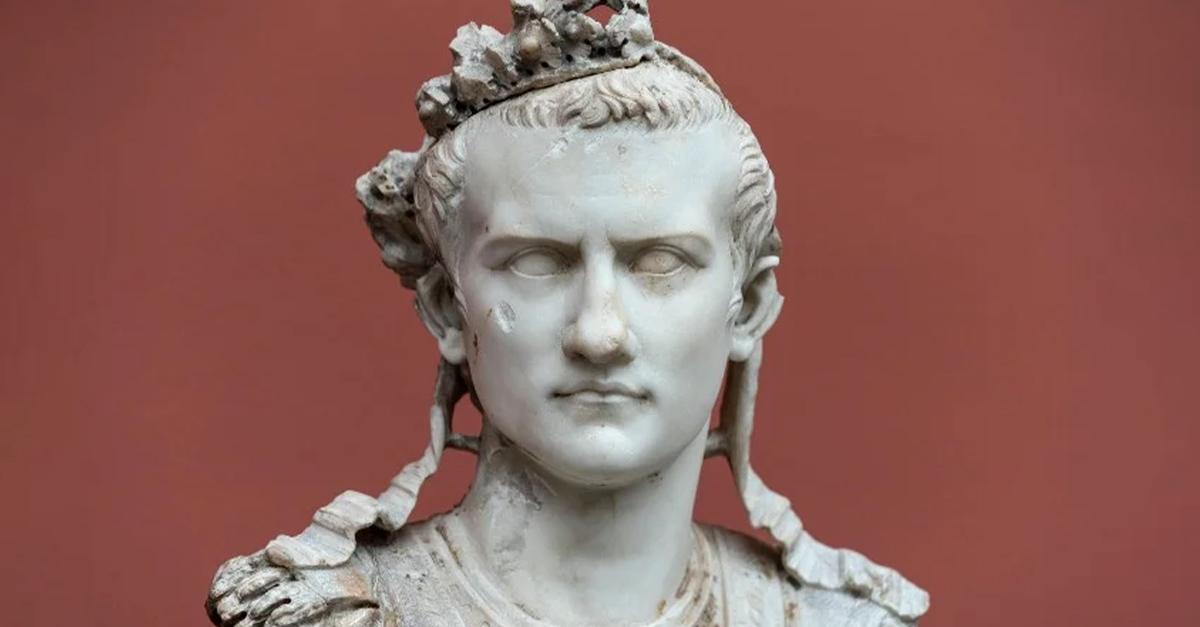
60. Erased From History
By the time Caligula's life ended, he had become so despised, the Senate ardently moved to completely expunge his existence from Roman history. They ordered the destruction of his statues and public inscriptions, and his coins were pulled from circulation and melted down whenever possible.










